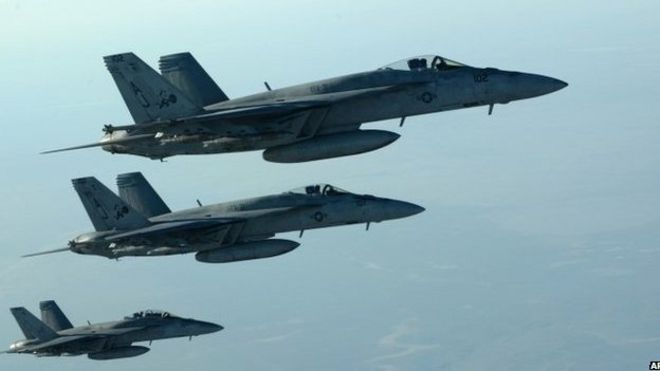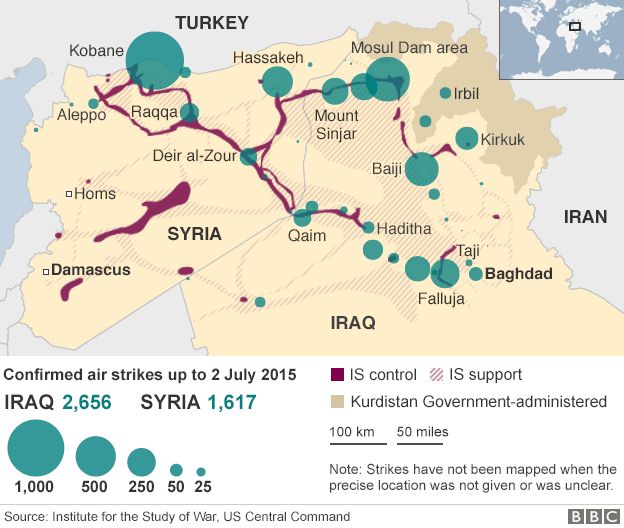
This is despite UK MPs voting in 2013 against military action in Syria.
About 20 personnel, including three pilots, have been embedded with other coalition nations' forces, including the US and Canada, the BBC understands.
Tory MP John Baron said the personnel should be withdrawn as Parliament "said no to military intervention".
He told the BBC the government should explain its position as it showed "insensitivity to Parliament's will".
"Those troops or individuals should be withdrawn from the embedded programme whilst this vote holds sway, while it stills hold authority, until we vote again," he said.
'Be transparent'
A Labour spokesman said the party will ask the Ministry of Defence to make a statement in the Commons on Monday."The programme to embed personnel with allies is extremely valuable to the development of our Armed Forces but the government needs to be transparent about the role they play," he said.
The MoD said personnel embedded with the US, French and Canadian armed forces had been "authorised to deploy with their units to participate in coalition operations" against IS.
"UK embeds operate as if they were the host nation's personnel, under that nation's chain of command," it said.
The MoD said UK pilots were not currently taking part in the region, but ministers would have been aware of their recent role.
The information emerged following a Freedom of Information request submitted by the human rights group Reprieve.

Sir Michael Graydon, former chief of the air staff, said the exchange programme between the UK and its allies had been happening for "many decades".
"My personal view is that what the government has decided in this particular case under these circumstances is right," he told the BBC.
"There are very few people involved in this, there are none at the moment, the chances are there won't be for another two or three months.
"I just think the practice of this is really much more sensible - to allow them to be embedded and to operate, which is what they have been doing, not to make a huge issue of it."
- 30 August 2013: The government is defeated as MPs say no to military action against Syrian President Bashar al-Assad's government by 285-272
- 23 September 2014: The first US-led air strikes on Islamic State targets in Syria take place
- 26 September 2014: MPs back British participation in air strikes against Islamic State militants in Iraq, by 524 to 43
- 30 September 2014: The RAF carries out its first air strikes of the Iraq mission
She said it was "alarming" that Parliament and the public had been "kept in the dark about this for so long" and she called for "an open and honest debate" about UK involvement in Iraq and Syria.
UKIP defence spokesman and MEP Mike Hookem said the MoD were using a "smokescreen to deceive the British people after MPs voted against British involvement in Syria".
"Enough British soldiers have been sent to foreign wars," he said.
Crispin Blunt, Conservative MP and Foreign Affairs Committee chairman, said the 2013 vote on action in Syria was a "totally different decision" to the question of strikes on IS and that that decision had not been undermined.
He said ministers would have been aware of what the embedded pilots would have been asked to do.
Defence Secretary Michael Fallon said on Thursday that the UK was engaged in a "new Battle of Britain" against IS, as he confirmed the deployment of a second RAF Rivet Joint spy plane to the region.
Commons vote
On 30 August 2013 MPs rejected possible UK military action against Syrian President Bashar al-Assad's government to deter the use of chemical weapons.Prime Minister David Cameron said he would respect the defeat of a government motion by 285-272, and ruled out joining US-led strikes.
The US and five Arab allies launched the first strikes against IS militants in Syria in September last year.
Parliament then approved UK participation in the strikes against IS extremists in Iraq by 524 votes to 43.
Last month Mr Fallon urged MPs to consider backing air strikes on IS in Syria and said the extremists needed to be targeted "at source".
Labour has indicated it would not oppose military action in Syria. Acting leader Harriet Harman has said the case for air strikes was now different to the situation in 2013, when Labour voted against UK military action in Syria.
Britain has already been carrying out surveillance and air-to-air refuelling operations over Syria.
http://www.bbc.co.uk/news/uk-33562420

No comments:
Post a Comment